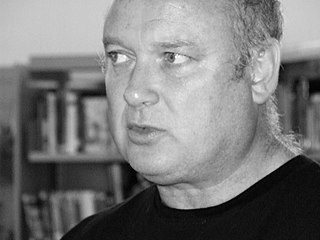A Quote by David Crystal
The death of a language. The word has the same kind of reluctant resonance as it has when we talk about the death of a person. And indeed, that's how it should be. For that's how it is. A language dies only when the last person who speaks it dies.
Related Quotes
Love never dies a natural death. It dies because we don't know how to replenish its source. It dies of blindness and errors and betrayals. It dies of illness and wounds; it dies of weariness, of witherings, of tarnishings. Anaïs Nin I like not only to be loved, but also to be told I am loved. George Eliot Love is the voice under all silences, the hope which has no opposite in fear; the strength so strong mere force is feebleness: the truth more first than sun, more last than star.
Some day soon, perhaps in forty years, there will be no one alive who has ever known me. That's when I will be truly dead - when I exist in no one's memory. I thought a lot about how someone very old is the last living individual to have known some person or cluster of people. When that person dies, the whole cluster dies,too, vanishes from the living memory. I wonder who that person will be for me. Whose death will make me truly dead?
As long as you think of your real self as the person you are, then of course you're going to be fearful of death. But what is a person? A person is a pattern of behavior, of a larger awareness. You know, the two-year-old dies before the three-year-old shows up, the three-year-old dies before the teenager shows up.
There is no single best kind of death. A good death is one that is "appropriate" for that person. It is a death in which the hand of the way of dying slips easily into the glove of the act itself. It is in character, ego-syntonic. It, the death, fits the person. It is a death that one might choose if it were realistically possible for one to choose one's own death.
Mohammed knew that most people are terribly cowardly and stupid. That is why he promised two beautiful women to every courageous warrior who dies in battle. This is the kind of language a soldier understands. When he believes that he will be welcomed in this manner in the afterlife, he will be willing to give his life, he will be enthusiastic about going to battle and not fear death. You may call this primitive and you may laugh about it, but it is based on deeper wisdom. A religion must speak a man's language.
In deference to such spectacular carnage it is perhaps perverse to dwell upon one person's death, but we are creatures so constituted that the passing of one friend or one acquaintance has a profounder effect that that of 100,000 strangers. If there is any metaphorical truth in the Jewish proverb that he who saves one life saves the whole world, then there is equal metaphorical truth in the proposition that when one person dies, the whole world dies with them.
How I wish that all men and women of good will would look to the Cross if only for a moment! There, we can see God’s reply: violence is not answered with violence, death is not answered with the language of death. In the silence of the Cross, the uproar of weapons ceases and the language of reconciliation, forgiveness, dialogue, and peace is spoken.
She alone dares and wishes to know from within, where she, the outcast, has never ceased to hear the resonance of fore language. She lets the other language speak - the language of 1,000 tongues which knows neither enclosure nor death. To life she refuses nothing. Her language does not contain, it carries; it does not hold back; it makes possible.



































